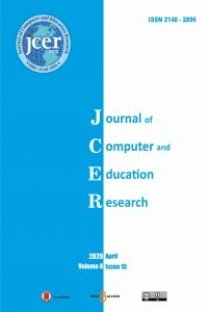Implementation of Design-Based Research in Software Engineering Education: A Case of Final Project Course
Design-based research, engineering education, software engineering, improving classroom teaching
Implementation of Design-Based Research in Software Engineering Education: A Case of Final Project Course
Design-based research, engineering education, software engineering, improving classroom teaching,
___
- Amiel, T., & Reeves, T. C. (2008). Design-based research and educational technology: Rethinking technology and the research agenda. Educational Technology & Society, 11(4), 29-40.
- Anderson, T., & Shattuck, J. (2012). Design-based research a decade of progress in education research?. Educational Researcher, 41(1), 16-25. Aşık, G., & Yılmaz, Z. (2017). Design-based research and teaching experiment methods in mathematics education: Differences and similarities. Journal of Theory and Practice in Education, 13(2), 343-367.
- Baltacı, S., Yıldız, A., Kıymaz, Y., & Aytekin, C. (2016). Reflections from a design based research preparing GeoGebra supported activities towards gifted students. Mehmet Akif Ersoy University Journal of Education Faculty, 1(39), 70-90.
- Barab, S., & Squire, K. (2004). Design-based research: Putting a stake in the ground. The Journal of Learning Sciences, 13(1), 1-14.
- Brown, A.L. (1992). Design experiments: Theoretical and methodological challenges in creating complex interventions in classroom settings. Journal of the Learning Sciences, 2(2), 141–178.
- Collins, A., Joseph, D., & Bielaczyc, K. (2004). Design research: Theoretical and methodological issues. Journal of the Learning Sciences, 13(1), 15-42.
- Coşkunserçe, O., & Erişti, S. D. B. (2017). Development of an online orientation system for international students’ cultural adjustment process through design based research methodology. Educational Technology Theory and Practice, 7(1), 83-104.
- Dönmez, O, Yaman, F, Şahin, Y, & Kabakçı-Yurdakul I (2016). Developing mobile applications for hearing-impaired: Wheel of fortune. Educational Technology Theory and Practice, 6(1), 22-41.
- Ercan, S., & Şahin, F. (2015). The usage of engineering practices in science education: Effects of design based science learning on students’ academic achievement. Necatibey Faculty of Education Electronic Journal of Science and Mathematics Education, 9(1), 128-164.
- Jollands, M., Jolly, L., & Molyneaux, T. (2012). Project-based learning as a contributing factor to graduates’ work readiness. European Journal of Engineering Education, 37, 143-154.
- Kuzu, A., Cavkaytar, A., Çankaya, S., & Öncül, N. (2013). Participants’ views about mobile skill teaching software developed for parents of individuals with intellectual disability. Anadolu Journal of Educational Sciences International, 3(2), 1-21.
- Kuzu, A., Çankaya, S., & Mısırlı, Z. A. (2011). Design-based research and its implementation in the design and development of learning environments. Anadolu Journal of Educational Sciences International, 1(1), 19-35.
- Lesh, R., & Sriraman, B. (2005). Mathematics education as a design science. ZDM, 37(6), 490-505.
- McKenney, S., & Reeves, T. C. (2013). Systematic review of design-based research progress: Is a little knowledge a dangerous thing?. Educational Researcher, 42(2), 97-100.
- Mills, J. E., & Treagust, D. F. (2003). Engineering education - Is problem-based or project-based learning the answer?. Australasian Journal of Engineering Education, 3(2), 2-16.
- Özyurt Ö., & Özyurt H. (2017). Design-based research and applicability in software engineering education, I. International Turkish World Engineering and Science Congress, Antalya, Turkey.
- Reeves, T. C. (2000). Enhancing the worth of instructional technology research through “design experiments” and other development research strategies. International perspectives on instructional technology research for the 21st century, New Orleans, LA, USA.
- Sandoval, W. A., & Bell, P. (2004). Design-based research methods for studying learning in context: Introduction. Educational psychologist, 39(4), 199-201.
- Tural-Sönmez, M. (2017). Matematiksel modelleme problemlerinin yapılandırılması üzerine tasarım tabanlı inceleme: finansal içerik örneği [Design based Investigation on construction of mathematical modelling problems: example of financial content]. Journal of Computer and Education Research, 5(10), 218-240.
- Wang, F., & Hannafin, M.J. (2005). Design-based research and technology-enhanced learning environments. Educational Technology Research and Development, 53(4), 5-23.
- Yaman, F., Dönmez, O., Avcı, E., & Yurdakul, I. K. (2016). Integrating mobile applications into hearing impaired children's literacy instuction. Education and Science, 41(188), 153-174.
- Yıldırım, G. (2014). Enrichment prosess of e-books intended for tablet computers with video: A design based research. (Unpublished PhD Thesis). Atatürk University, Erzurum.
- Zhou, C. (2012). Integrating creativity training into problem and project based learning curriculum in engineering education. European Journal of Engineering Education, 37, 488–499.
- Yayın Aralığı: 2
- Başlangıç: 2013
- Yayıncı: Tamer KUTLUCA
Ortaokul Öğrencilerine Yönelik “Türkçe Dersine Yönelik Motivasyon Ölçeği” Geliştirme Çalışması
Investigation of in-School Factors Affecting Distributed Leadership Practices
Hülya DEMİRCİOĞLU, Rabia ÖZDEMİR
Gülsün KARSLI, Orhan KARAMUSTAFAOĞLU, Murat KURT
Development of Animation Attitude Scale (AAS): Validity And Reliability Study
